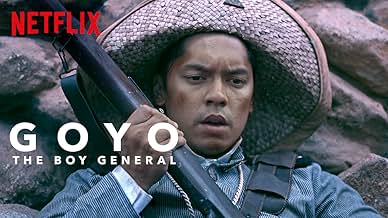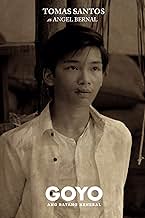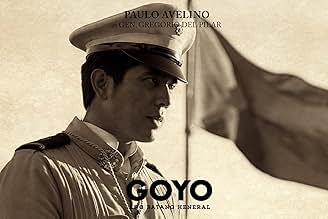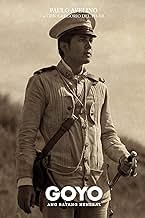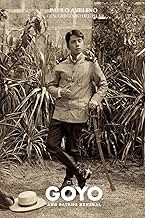IMDb-BEWERTUNG
6,5/10
1090
IHRE BEWERTUNG
Füge eine Handlung in deiner Sprache hinzuThe story of Gregorio 'Goyo' del Pilar, one of the youngest Generals during the Philippine-American War who fought in the historic Battle of Tirad Pass.The story of Gregorio 'Goyo' del Pilar, one of the youngest Generals during the Philippine-American War who fought in the historic Battle of Tirad Pass.The story of Gregorio 'Goyo' del Pilar, one of the youngest Generals during the Philippine-American War who fought in the historic Battle of Tirad Pass.
- Regie
- Drehbuch
- Hauptbesetzung
- Auszeichnungen
- 7 Gewinne & 29 Nominierungen insgesamt
Jeffrey Quizon
- Apolinario Mabini
- (as Epy Quizon)
Arthur Acuña
- Manuel Bernal
- (as Art Acuna)
Tommy Alejandrino
- Angel Bernal
- (as Tomas Santos)
Empfohlene Bewertungen
My favorite thing about Goyo is how it handled the small story of the native guides. It didn't say much out loud, but the inherent folly resonated.
My least favorite thing: mango shopping.
My least favorite thing: mango shopping.
Goyo: Ang Batang Heneral was not a conventional historical movie. More often than not, movies of this kind show "heroes" as exactly that-- fearless, determined, and ready to sacrifice for the greater good. What I liked most about this movie, then, is that it strays from this way of storytelling and tells us that our heroes are still painfully human.
Gregorio del Pilar was heralded as one of the bravest men in Philippine history, but this film makes the statement that, behind all the glory and revere, Goyo is still what the title suggests: isa syang bata. I appreciated how the film highlighted the mischievous parts about him, his lack of foresight in battle, his obsession with love. All of this shows the audience that he was just 23, behind the grandeur of it all, and that maybe he was carrying a burden heavier than he pretended he could handle.
Gregorio del Pilar was heralded as one of the bravest men in Philippine history, but this film makes the statement that, behind all the glory and revere, Goyo is still what the title suggests: isa syang bata. I appreciated how the film highlighted the mischievous parts about him, his lack of foresight in battle, his obsession with love. All of this shows the audience that he was just 23, behind the grandeur of it all, and that maybe he was carrying a burden heavier than he pretended he could handle.
Goyo, Ang Batang Heneral is not just a period film re-telling our History, neither a simple account of what transpired in the battle of Tirad Pass against the Americans, and not just an artistic expression of the director and the writers; "Goyo" is a film that defines and connects our past to our present plight as a People and as a Nation and the dialectics of our history--We are because of what we were and we will be for what we are now.
The film gives the audience a sharp and deeper insight about us Filipinos-past and present. In one of the dialogues of Apolinario Mabini in the film that really struck me and it was mentioned 3 times, if I remember it right. I may not be able to recall the exact lines but let me paraphrase it; "The Americans have always regarded the Filipinos to be like children, and there may be some truth to that". What is the subtext of the line then? Our leaders are like children-immature and selfish, prioritizing their own Political Agenda, always wanted to ensure hold of power and personal convenience. And these things affected our struggle against colonial rulers and our quest for freedom. Sadly, these children-like traits are still prevalent in our present leadership as the struggle of every Filipino shifts not from Colonial rule but against poverty, inequality, corruption and abuse of power with emphasis on the treachery and betrayal of some of our fellow Filipinos serving their personal interests.
"Goyo" is a well-written screenplay, the main plot as told by Apolinario Mabini (played by Eppie Quizon) describes the internal machinations among the Filipino Generals and Aguinaldo during the Philippine-American War. While sub-plots depicting the perspectives and experiences of Joven Hernando (played by Arron Villaflor) who typifies a Filipino caught in between crossfires; and Goyo-Del Pilar (played by Paulo Avelino) despite being a General who is notable for his courage, in the battles he won and a mercenary henchman against Filipinos opposing Aguinaldo, was depicted to be more human having a conscience that chases him in his nightmares and dreams.
The approach to reality shifts from realism to surreal, while dialogues use contemporary language with a blend of lyrical phrasing that made the interaction between characters easy to understand and relate with.
Cinematography is commendable without any effort to make the scene superfluously dramatic that includes the camera shots, angles and movement. Color and texture of the film brings you to the era of 1890's without much of sepia or black and white schemes.
Just like in any period film, Production design has always been challenging, like Katipunero's or Soldiers uniform to be very neat like a newly tailored fit; a location where houses and other structures are obviously fabricated and constructed.
I laud "Goyo" Production Designer for an excellent job, gone are the uniforms of the Soldiers who look like freshly ironed even after a battle and no more hand props that look unreal. There may still be issues with the details like texture and finish windows, wall or roofing; structures that are still obviously fabricated, which maybe improved on the next period films. Remarkably, the production design has given the audience the experience of 1890's era.
The music score is also notable as it served its purpose of complimenting the development of the Film. It was designed to accentuate key sequences, and share with the audience the same level of emotion as the characters in the film have.
Bravo! Paulo Avelino, Alvin Anson, Mon Confiado, Arthur Acuna, Jeffrey Quizon, Carlo Aquino and Gwen Zamora for an outstanding performance.
Kudos to Director Jerrold Tarog, Screenwriter Rody Vera, Producers of Artikulo Uno, Cast and Crew!!
The film gives the audience a sharp and deeper insight about us Filipinos-past and present. In one of the dialogues of Apolinario Mabini in the film that really struck me and it was mentioned 3 times, if I remember it right. I may not be able to recall the exact lines but let me paraphrase it; "The Americans have always regarded the Filipinos to be like children, and there may be some truth to that". What is the subtext of the line then? Our leaders are like children-immature and selfish, prioritizing their own Political Agenda, always wanted to ensure hold of power and personal convenience. And these things affected our struggle against colonial rulers and our quest for freedom. Sadly, these children-like traits are still prevalent in our present leadership as the struggle of every Filipino shifts not from Colonial rule but against poverty, inequality, corruption and abuse of power with emphasis on the treachery and betrayal of some of our fellow Filipinos serving their personal interests.
"Goyo" is a well-written screenplay, the main plot as told by Apolinario Mabini (played by Eppie Quizon) describes the internal machinations among the Filipino Generals and Aguinaldo during the Philippine-American War. While sub-plots depicting the perspectives and experiences of Joven Hernando (played by Arron Villaflor) who typifies a Filipino caught in between crossfires; and Goyo-Del Pilar (played by Paulo Avelino) despite being a General who is notable for his courage, in the battles he won and a mercenary henchman against Filipinos opposing Aguinaldo, was depicted to be more human having a conscience that chases him in his nightmares and dreams.
The approach to reality shifts from realism to surreal, while dialogues use contemporary language with a blend of lyrical phrasing that made the interaction between characters easy to understand and relate with.
Cinematography is commendable without any effort to make the scene superfluously dramatic that includes the camera shots, angles and movement. Color and texture of the film brings you to the era of 1890's without much of sepia or black and white schemes.
Just like in any period film, Production design has always been challenging, like Katipunero's or Soldiers uniform to be very neat like a newly tailored fit; a location where houses and other structures are obviously fabricated and constructed.
I laud "Goyo" Production Designer for an excellent job, gone are the uniforms of the Soldiers who look like freshly ironed even after a battle and no more hand props that look unreal. There may still be issues with the details like texture and finish windows, wall or roofing; structures that are still obviously fabricated, which maybe improved on the next period films. Remarkably, the production design has given the audience the experience of 1890's era.
The music score is also notable as it served its purpose of complimenting the development of the Film. It was designed to accentuate key sequences, and share with the audience the same level of emotion as the characters in the film have.
Bravo! Paulo Avelino, Alvin Anson, Mon Confiado, Arthur Acuna, Jeffrey Quizon, Carlo Aquino and Gwen Zamora for an outstanding performance.
Kudos to Director Jerrold Tarog, Screenwriter Rody Vera, Producers of Artikulo Uno, Cast and Crew!!
... what is it good for? Well some might argue for movies and I reckon they wouldn't be that wrong. So another one of the based on a true story. I don't know all the details and the movie might take some liberal approaches on certain things (quite likely it does).
The battle scenes are very well choreographed and the drama and story building is quite nice. If you like movies that shine a light on things like this, you will be more than satisfied.
The battle scenes are very well choreographed and the drama and story building is quite nice. If you like movies that shine a light on things like this, you will be more than satisfied.
Do not confuse production quality to overall film quality.
Reasons: It was basically narrated. I don't see why this wasn't released as a book instead.
There was no directing involved just some fancy angles and color editing (which was really good for a Filipino film)
Scoring was too good not to get noticed
Some of the actors were good
A bit pretentious especially when the narration comes back in.
There was no climax whatsover.
So yeah, 4 stars
Reasons: It was basically narrated. I don't see why this wasn't released as a book instead.
There was no directing involved just some fancy angles and color editing (which was really good for a Filipino film)
Scoring was too good not to get noticed
Some of the actors were good
A bit pretentious especially when the narration comes back in.
There was no climax whatsover.
So yeah, 4 stars
Wusstest du schon
- WissenswertesThis movie is a sequel of Heneral Luna (2015), also directed by Jerrold Tarog.
- VerbindungenFollowed by Quezon (2025)
- SoundtracksThe Star & Stripes Forever (1897)
Top-Auswahl
Melde dich zum Bewerten an und greife auf die Watchlist für personalisierte Empfehlungen zu.
- How long is Goyo: The Boy General?Powered by Alexa
Details
- Erscheinungsdatum
- Herkunftsland
- Offizielle Standorte
- Sprachen
- Auch bekannt als
- Goyo: The Boy General
- Produktionsfirmen
- Weitere beteiligte Unternehmen bei IMDbPro anzeigen
- Laufzeit
- 2 Std. 35 Min.(155 min)
- Farbe
- Sound-Mix
- Seitenverhältnis
- 2.35 : 1
Zu dieser Seite beitragen
Bearbeitung vorschlagen oder fehlenden Inhalt hinzufügen

![Trailer [OV] ansehen](https://m.media-amazon.com/images/M/MV5BZDVhMTkzY2ItOWJkZS00MTYwLTlmOWEtYWEzOTcxM2IyZDE5XkEyXkFqcGdeQXRyYW5zY29kZS13b3JrZmxvdw@@._V1_QL75_UX500_CR0)
